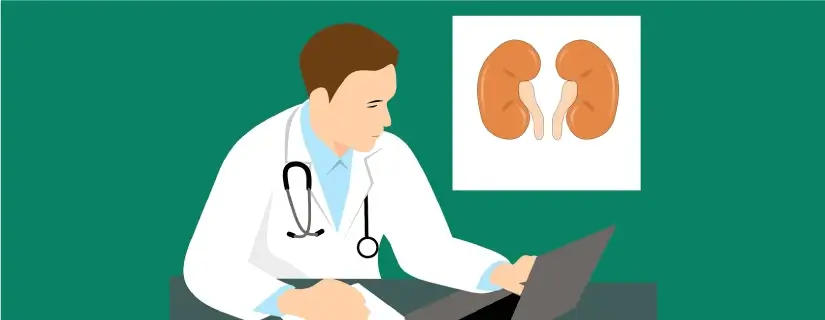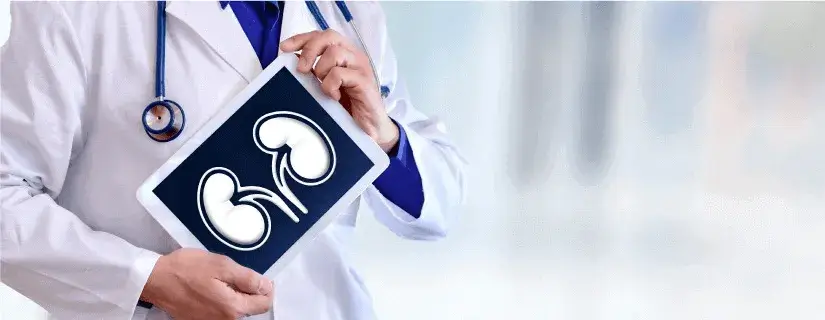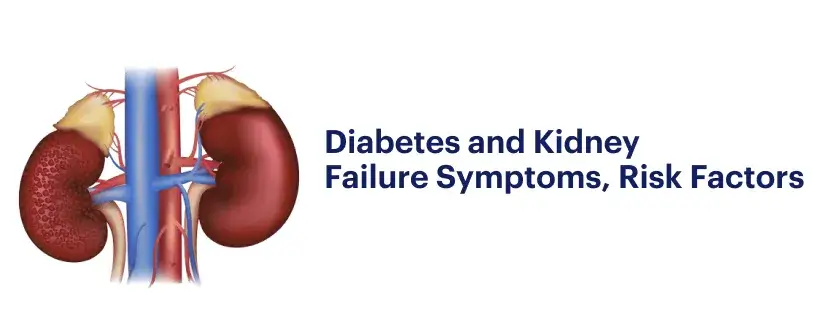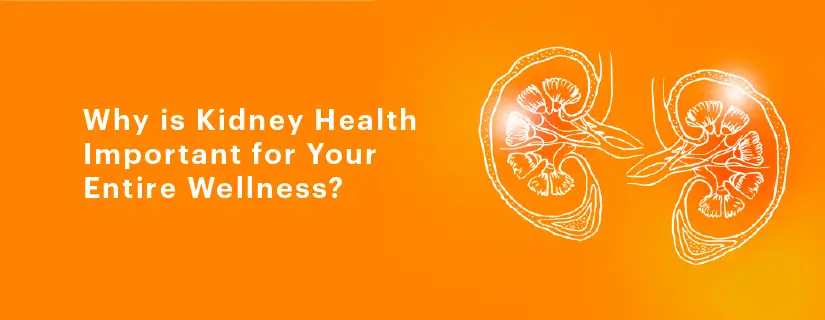-
Doctors
-
Specialities & Treatments
Centre of Excellence
Specialties
Treatments and Procedures
Hospitals & Directions HyderabadCARE Hospitals, Banjara Hills CARE Outpatient Centre, Banjara Hills CARE Hospitals, HITEC City CARE Hospitals, Nampally Gurunanak CARE Hospitals, Musheerabad CARE Hospitals Outpatient Centre, HITEC City CARE Hospitals, Malakpet
HyderabadCARE Hospitals, Banjara Hills CARE Outpatient Centre, Banjara Hills CARE Hospitals, HITEC City CARE Hospitals, Nampally Gurunanak CARE Hospitals, Musheerabad CARE Hospitals Outpatient Centre, HITEC City CARE Hospitals, Malakpet Raipur
Raipur
 Bhubaneswar
Bhubaneswar Visakhapatnam
Visakhapatnam
 Nagpur
Nagpur
 Indore
Indore
 Chh. Sambhajinagar
Chh. SambhajinagarClinics & Medical Centers
Book an AppointmentContact Us
Online Lab Reports
Book an Appointment
Consult Super-Specialist Doctors at CARE Hospitals
Kidney Infection: Symptoms, Causes, Diagnosis, Treatment and Prevention
Updated on 22 March 2024
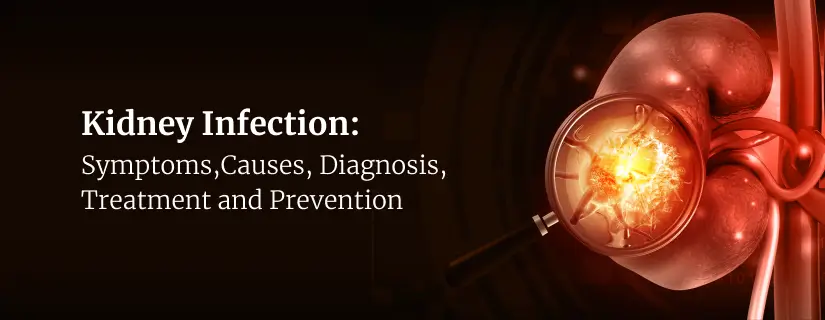
Kidney infection or pyelonephritis is a type of infection which occurs as a result of bacteria or viruses. The kidneys are bean shaped organs responsible for the removal of toxins and waste products from the blood. The connection to other parts of the urinary tract, such as the bladder, makes the kidneys vulnerable to developing infections. If infections in these organs go unchecked, they may spread to the kidneys.

Symptoms of a Kidney Infection
When infection of the kidney spreads, it develops quite rapidly, often within a day or even a few hours. Common signs of a kidney infection may include:
- Blood or pus in the urine
- Pain on the side or lower back
- Pain while urinating
- Fever and chills
- Frequent or urgent need to urinate
- Upset stomach or vomiting
- Loss of appetite
- Weakness
A kidney infection is often accompanied by urinary tract infection which may cause burning sensation while urinating along with other symptoms like:
- Cloudy urine
- Foul smelling urine
- Incomplete bladder emptying
- Frequently feeling the need to urinate
- Pain in the lower abdomen
- Confusion
Causes of Kidney Infection
The most common causes of kidney infection are bacterial infestation but viruses may be the cause too. However, viruses rarely cause an infection in an otherwise healthy person. An infection in the kidney is most commonly triggered when these pathogens enter through the urethra and spread. In the majority of the cases, these pathogens travel upwards to the kidney and start an infection.
Some common bacteria that cause kidney infections include the following:
- E. Coli
- Enterobacter
- Staphylococcus
- Protean mirabilis
Diagnosis of Kidney Infection
A doctor may diagnose kidney infection through a physical examination, medical history review, and imaging tests or blood tests as deemed suitable by them. Initially, the doctor may check the overall health of the patient by checking their blood pressure, heart and breathing rate, body temperature, and signs of dehydration. The doctor may also look for tenderness or sensitivity in the lower or mid back areas.
Laboratory or clinical examinations that may be recommended by a doctor for diagnosing a kidney infection may include:
- Rectal exam: This is usually performed for men suspected of having a kidney infection, where their prostate is checked for signs of inflammation or enlargement that may be blocking the flow of urine.
- Pelvic exam: Women with kidney infections may need to undergo a pelvic exam for the doctor to identify any asymptomatic pelvic inflammatory disease.
- Imaging test: Patients may be recommended to get a CT or MRI scan, or an ultrasound scan of the kidneys.
- Urine test: An urinalysis may be required to look for bacteria, and red and white blood cells.
Treatment of Kidney Infection
Treatment of kidney infection may depend upon the overall health of the patient and how far the infection has spread. Common treatment approaches include:
- Antibiotics: The primary line of treatment for kidney infection involves antibiotics which patients may need to take for a period of 14 days. The type of antibiotics recommended by the doctor may depend upon the medical history of the patients and their sensitivity towards any medications. Pain medications may also be recommended during kidney infection treatment.
- Fluids: Patients with kidney infection may be asked to consume ample amounts of fluids to prevent dehydration symptoms of kidney infection.
- IV Treatment: If a patient doesn't show improvement in their symptoms, they may need to be treated at the hospital. Antibiotics may be administered intravenously through a vein in their arm. Patients who are severely dehydrated may also be provided fluids intravenously.
- Surgery: A patient who has contracted kidney infection due to an enlarged prostate or kidney stone may need surgical treatment to remove the blockage.
Risk Factors
Following are the risk factors for a kidney infections:
- Women are more likely to experience urinary or kidney infections than men due to the natural anatomical structure of their urethra, which is typically shorter than men. Additionally, the proximity of the anus to the vagina makes it easier for bacteria to enter the urethra quite easily.
- Pregnant women are also likely to develop kidney infections as at this stage, hormonal changes occur. Coupled with the fact that the growing baby may put pressure on the bladder and ureter of the mother, they are more prone to developing kidney infections.
- Kidney stones, prolapsed uterus, or enlarged prostate may cause a blockage to the normal flow of urine. Such obstruction causes bacteria to breed and spread within the bladder which then spreads to the kidneys. This may also occur in pregnant women.
- HIV and diabetes are two conditions which may increase the likelihood of developing kidney infections. Being on immunosuppressant medicines may also have the same effect.
- Vesicoureteral reflect is a condition in which urine doesn't travel in the right way and instead travels up the bladder.
Complications
If a person with kidney infection doesn't seek prompt medical attention, it may lead to serious complications. These may include:
- Kidney abscess: Pus may accumulate in the kidney tissues causing kidney infection symptoms like blood in urine, abdominal pain, and weight loss.
- Sepsis: It is a medical emergency in which the patient's blood pressure drops very low, affecting their blood circulation. It may lead to very slow circulation of blood causing blood clots which in turn can cause the kidneys to fail when the blood isn't circulating properly. Sepsis may cause breathing difficulties, seizures, and even coma.
- Renal vein thrombosis: Blood clot in a major kidney vein may lead to a lack of blood in the organ. This may lead to chronic kidney disease.
- Acute renal failure: In this condition, one or both the kidneys of the person fail to work and require dialysis.
Prevention
Kidney infection is often a result of pre-existing infection of the urinary tract. To prevent kidney infection, it is important to ensure prevention of infections in the urethra or bladder. Here are some tips to follow to prevent kidney infections:
- Hydration: Consume ample fluids, especially water, and do it often to flush out bacteria and other infection causing germs.
- Fiber: Consume enough fibers to ensure smooth movement of bowels and stools, and prevent irritation or skin lesion. Constipation may increase the risk of kidney stones as well.
- Urination: Don't hold back urine.
- Sexual intercourse: Wash the intimate areas with water and urinate after intercourse.
- Personal Hygiene: Don't use chemical products or deodorants in or around the genitals and wash them with water everyday.
- Toilet Hygiene: Wash the anus after passing stool from front to back and never the other way round.
When to See a Doctor
Kidney infection may spread quickly if prompt treatment is not given. A person should see a doctor if they're experiencing the early signs of kidney infection:
- Persistent pain in the lower to mid back area.
- Fever with chills and shivers
- Feeling general unwell or nausea
Conclusion
A kidney infection may occur in both males and females, and may develop quite rapidly. In most cases, kidney infections may resolve on their own with ample hydration and a course of antibiotics. However, some people may require additional treatment. Kidney infections can be prevented by taking proper care and maintaining personal hygiene.
FAQs
1. Is a kidney infection serious?
If treated with prompt medical attention, it may not be serious. But if a kidney infection is left untreated, it may cause serious complications of the kidney that may even be life-threatening.
2. What foods help repair kidneys?
Kidney-friendly foods that help repair the kidneys may include:
- Blueberries
- Apples
- Kale
- Spinach
- Sweet potatoes
- Fish
- Pineapples
- Garlic
- Cabbage
- Cauliflower
- Onions
- Egg whites
- Skinless chicken
- Turnips, etc.
3. Who is more likely to get a kidney infection?
Females of all ages and men above the age of 60 are more likely to develop a kidney infection.

ENQUIRY FORM
SELECT CATEGORIES
-
Neurosciences (16)
-
Neurology (37)
-
Neurosurgery (14)
-
Orthopaedics (48)
-
Oncology (33)
-
Obstetrics and gynecology (52)
-
Pulmonology (23)
-
Urology (20)
-
Nephrology (13)
-
Psychiatry (7)
-
Dietetics and Nutrition (111)
-
General Medicine (63)
-
Cardiac Sciences (32)
-
Vascular & Endovascular Surgery and Interventional Radiology (15)
-
Gastroenterology (46)
-
Endocrinology (23)
-
Plastic Surgery (10)
-
Critical Care Medicine (5)
-
COVID-19 (16)
-
Dermatology (16)
-
Emergency Care (1)
-
Ophthalmology (4)
-
Pediatrics (14)
-
Laparoscopic and Bariatric Surgery (8)
-
ENT (15)
-
Kidney Transplant (1)
-
Liver Transplantation and Hepatobiliary Surgery (5)
-
General Surgery (3)
-
Internal Medicine (5)
-
Medicine Information
Difference Between Nephrotic and Nephritic Syndrome
Ketones in urine: Symptoms, Causes and Treatment
YOU MAY ALSO LIKE
RECENT BLOGS
-

Preterm Birth (Premature Birth): Symptoms, Causes, Treatment and Prevention
13 May 2025
Read More
-

Rotablation Angioplasty: Benefits, Treatments, And Recovery Time
9 May 2025
Read More
-

What Is The Difference Between IUI and IVF?
9 May 2025
Read More
-

Venous Malformations: Causes, Symptoms, and Treatment
30 April 2025
Read More
-

Varicose Vein Foam Sclerotherapy: Treatment, Benefits, and Procedure
30 April 2025
Read More
-

Radiofrequency (RF) Ablation Treatment for Varicose Veins: Know More
30 April 2025
Read More
-

Varicose Vein Sclerotherapy: Treatment, Benefits, and Procedure
30 April 2025
Read More
-

Varicose Vein Endovenous Laser Ablation: Procedure, Benefits, Risks
30 April 2025
Read More
Have a Question?
If you cannot find answers to your queries, please fill out the enquiry form or call the number below. We will contact you shortly.




